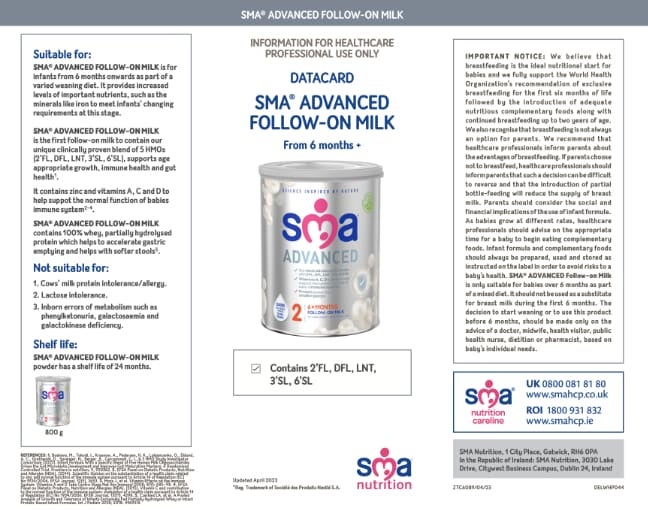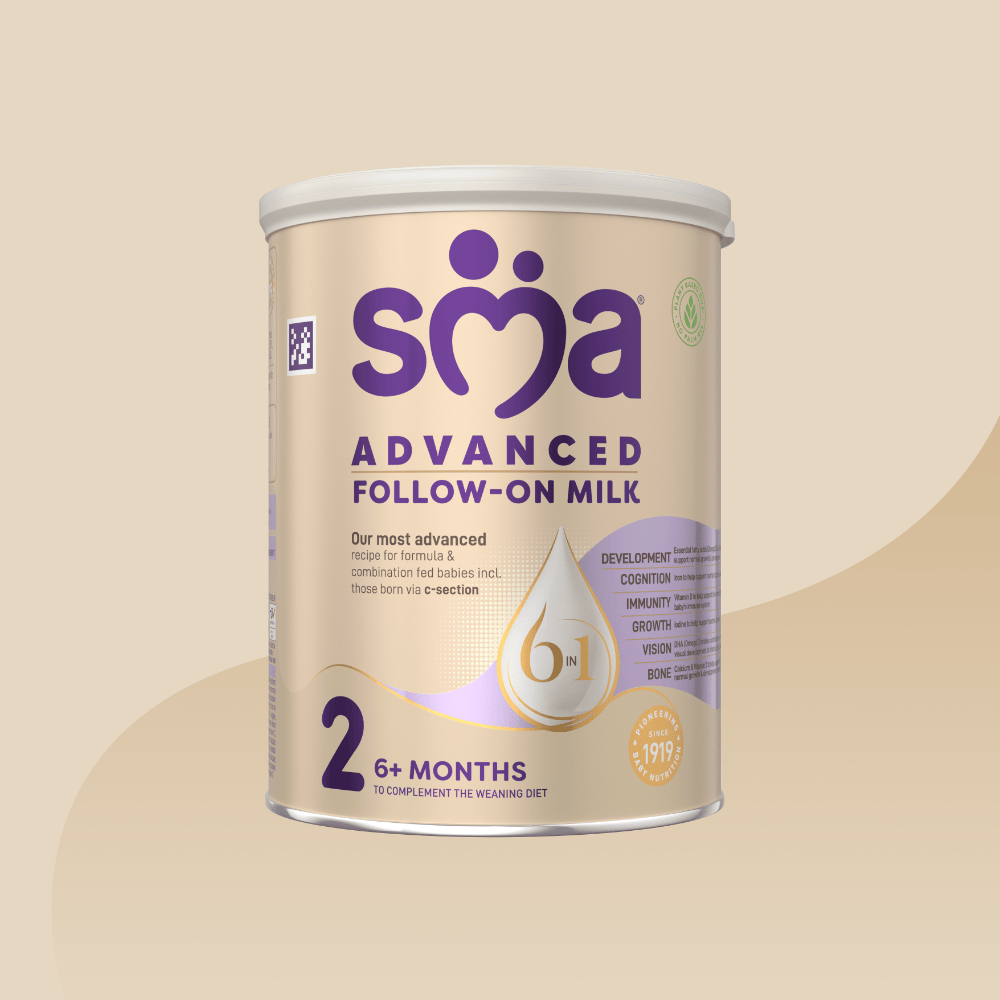SMA® ADVANCED Follow-on Milk
Specially designed to help support the infant's developing immune system1
A follow-on milk containing iron and designed specifically to meet the nutritional needs of babies from 6 months of age as part of a varied weaning diet.
The first follow-on milk to contain our unique clinically proven blend of 5 HMOs (2’FL, DFL, LNT, 3’SL, 6’SL) *
Data cards

Download the powder format data card
Product details

SMA® ADVANCED Follow-on Milk Powder Formula
800g Powder
The scoop is provided under the lid. It can be stored in suspension inside the can.
Feeding guide from 6 + months
| 1 serving = 200 ml | Amount of cooled, freshly boiled water | Number of scoops of powder | |
|---|---|---|---|
| 1 beaker/bottle | 180 ml | 6 fl. oz. (approx.) | 6 |
All babies are different but try to ensure that from 6 months to 1 year a baby has 500-600 ml of SMA® ADVANCED Follow-on Milk per day either as a drink, on cereals or mixed with food. Mix 1 scoop of powder to 30 ml (approx.1 fl. oz.)of water. Approx. 173 scoops per can. 1 scoop = 4.6 g. Approx. 29 x 200 ml servings per can.
- Do not add extra powder or water to make the feeds stronger or weaker and do not press powder into scoop. Using too much or too little powder can make your baby ill.
- We recommend preparing each feed in individual beaker/bottle when required.
- For hygienic reasons, discard unfinished feed in the beaker/bottle as soon as possible.
- Made-up formulae can be poured over cereals and mixed with food.
- Do not alter or add to formulae unless medically directed.
- Do not warm feeds in a microwave, hot spots may occur and cause scalding.
- Remember, cows' milk should not be used as a drink during the first year.
Preparation
How to prepare the baby's feed - powder
While this product is made under strict hygienic conditions, it is not sterile. Failure to follow instructions may make the baby ill.
- Bosheva, M., Tokodi, I., Krasnow, A., Pedersen, H. K., Lukjancenko, O., Eklund, A. C., Grathwohl, D., Sprenger, N., Berger, B., Cercamondi, C. I., & 5 HMO Study Investigator Consortium (2022). Infant Formula With a Specific Blend of Five Human Milk Oligosaccharides Drives the Gut Microbiota Development and Improves Gut Maturation Markers: A Randomized Controlled Trial. Frontiers in nutrition, 9, 920362. https://doi.org/10.3389/fnut.2022.920362
- EFSA Panel on Dietetic Products, Nutrition and Allergies (NDA). (2014). Scientific Opinion on the substantiation of a health claim related to zinc and normal function of the immune system pursuant to Article 14 of Regulation (EC) No 1924/2006. EFSA Journal, 12(5), 3653.
- Mora J, et al. Vitamin Effects on the Immune System: Vitamins A and D Take Centre Stage Nat Rev Immunol 2008; 8(9): 685–98.
- EFSA Panel on Dietetic Products, Nutrition and Allergies (NDA). (2015). Vitamin C and contribution to the normal function of the immune system: evaluation of a health claim pursuant to Article 14 of Regulation (EC) No 1924/2006. EFSA Journal, 13(11), 4298.
- Czerkies LA, et al. A Pooled Analysis of Growth and Tolerance of Infants Exclusively Fed Partially Hydrolyzed Whey or Intact Protein-Based Infant Formulas. Int J Pediatr 2018; 2018: 4969576.
- Domellöf M, et al. Iron Requirements of Infants and Toddlers. J Pediatr Gastroenterol Nutr 2014; 58: 119–29
- Lennox A et al. (2013) Diet and Nutrition Survey of Infants and Young Children. Available at: https://www.gov.uk/government/publications/diet-and-nutrition-survey-of-infants-and-young-children-2011 (accessed July 2022)
IMPORTANT NOTICE:
We believe that breastfeeding is the ideal nutritional start for babies and we fully support the World Health Organization’s recommendation of exclusive breastfeeding for the first six months of life followed by the introduction of adequate nutritious complementary foods along with continued breastfeeding up to two years of age. We also recognise that breastfeeding is not always an option for parents. We recommend that healthcare professionals inform parents about the advantages of breastfeeding. If parents choose not to breastfeed, healthcare professionals should inform parents that such a decision can be difficult to reverse and that the introduction of partial bottle-feeding will reduce the supply of breast milk. Parents should consider the social and financial implications of the use of infant formula. As babies grow at different rates, healthcare professionals should advise on the appropriate time for a baby to begin eating complementary foods. Infant formula and complementary foods should always be prepared, used and stored as instructed on the label in order to avoid risks to a baby’s health. SMA® ADVANCED Follow-on Milk is only suitable for babies over 6 months as part of a mixed diet. It should not be used as a substitute for breast milk during the first 6 months. The decision to start weaning or to use this product before 6 months, should be made only on the advice of a doctor, midwife, health visitor, public health nurse, dietitian or pharmacist, based on baby’s individual needs.





